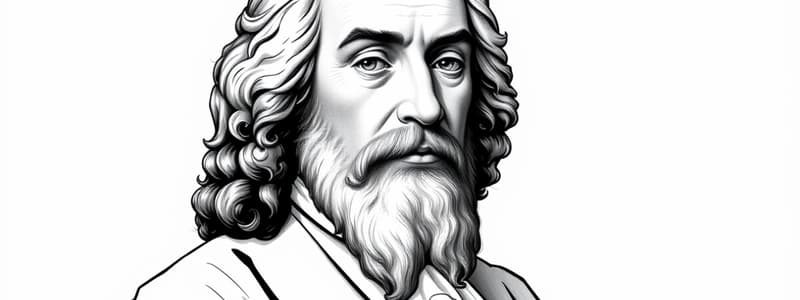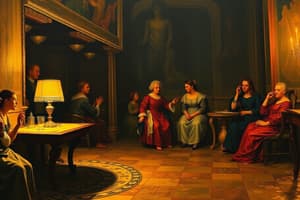Podcast
Questions and Answers
What is the French word for 'philosophers'?
What is the French word for 'philosophers'?
- Philosophes (correct)
- Sages
- Penseurs
- Savant
What did John Locke believe about the human mind at birth?
What did John Locke believe about the human mind at birth?
Every person was born with a blank mind.
What types of government did Baron de Montesquieu advocate for?
What types of government did Baron de Montesquieu advocate for?
Republic for small countries, monarchy for medium, and despotism for large.
What is Voltaire's view on God and religion?
What is Voltaire's view on God and religion?
What significant contribution did Denis Diderot make?
What significant contribution did Denis Diderot make?
What was Cesare Beccaria's stance on punishments?
What was Cesare Beccaria's stance on punishments?
What concept did Jean-Jacques Rousseau promote regarding individual's rights?
What concept did Jean-Jacques Rousseau promote regarding individual's rights?
What belief did Mary Wollstonecraft hold regarding women's rights?
What belief did Mary Wollstonecraft hold regarding women's rights?
What did Thomas Hobbes believe was necessary for government?
What did Thomas Hobbes believe was necessary for government?
Flashcards are hidden until you start studying
Study Notes
Enlightenment Philosophers
- "Philosophes" is the French term for philosophers, central to Enlightenment thought.
- John Locke posited that individuals are born with a tabula rasa (blank mind) shaped by experience, sensations, and environment.
- Baron de Montesquieu proposed three forms of government: republics for small nations, monarchies for medium ones, and despotism for large states. He advocated for checks and balances within government systems.
- Voltaire embraced deism, believing God created the universe and then withdrew. He opposed the Catholic Church but supported religious tolerance and freedom of thought.
- Denis Diderot edited and published the first Encyclopedia, a 28-volume work aimed at advancing intellectual and philosophical inquiry.
- Cesare Beccaria argued against cruel punishments and the death penalty, advocating for humane treatment within the justice system.
- Jean-Jacques Rousseau emphasized the idea that individuals surrender some rights to the "general will" for mutual benefits, outlined in his work "The Social Contract." He argued for an education system that nurtures natural instincts rather than curtailing them.
- Mary Wollstonecraft championed women's rights, asserting that if women can reason, they deserve equal rights to men. She was foundational to the women's rights movement in Europe and America.
- Thomas Hobbes believed that only an absolute sovereign could effectively manage human selfishness and societal conflicts; he also affirmed the importance of representation and individual rights.
Studying That Suits You
Use AI to generate personalized quizzes and flashcards to suit your learning preferences.





